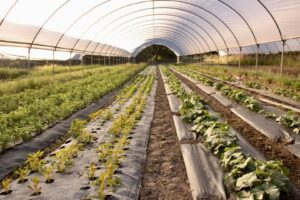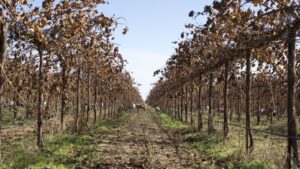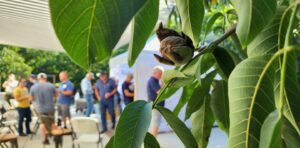ECOLOGICAL FARMING
We work with farmers, policy makers, researchers, and local technical assistance providers to promote, improve and better understand the implementation of ecological farming throughout California.
WHAT IS CLIMATE SMART FARMING?
Climate Smart Farming (CSF) refers to farming practices or systems that mitigate and adapt to climate change by reducing GHG emissions, sequestering carbon in the soil and plant biomass and conserving natural resources like water and topsoil. Climate smart farming highlights the nexus between farm productivity and resilience, conservation of natural resources and climate change adaptation and mitigation. For example, increasing soil organic matter can result in more productive fields that are more resilient to pest and disease pressure, conserve water through improved water holding capacity and infiltration, address climate change through soil carbon sequestration and can make farms more resilient to drought and flooding. While individual CSF practices provide important entry points into climate smart farming, the broader goal of CSF is to take a systems approach and see every farm and ranch as a unique agroecosystem.

ON-THE-GROUND PROJECTS
We conduct on-the-ground projects to bring together science and farmer experience to build better understanding around ecological best practices.

POLICY
We advocate for state funding that directs resources to farmers to implement ecological and climate smart practices as well as to programs that promote their adoption.

FARMER-TO-FARMER
We facilitate farmer-to-farmer exchange and extension that focuses on knowledge-sharing among farmers and technical assistance providers.

RESEARCH
We dig into the research and practice of ecological and climate smart farming to develop and share resources for the California agricultural community.

Benefits of Ecological Farming
Water holding capacity
Increased infiltration
Soil microbial ecology
Soil fauna (earthworms!)
Pest & disease resistance
Enhanced nutrient cycling
Soil structure
Soil organic matter
Carbon sequestration
Reduced erosion
Reduced GHG emissions
Reduced nitrate leaching
Resilience to disease
Drought & weather resilience
On-farm biodiversity
Improved productivity & yield
- There were no results found.
- There were no results found.
Calendar powered by The Events Calendar
PRACTICES
Ecological farming is not a single practice nor is it part of a rigid methodology. Rather, it’s a holistic approach that includes a suite of practices that farms and ranches can employ based on their own unique needs and circumstances to help build soil health, steward our natural resources, sequester carbon and better adapt to a fast-changing climate.
A few key ecological practices include the following:

 Farmscaping involves planting perennials including tree crops and vines, hedgerows, riparian buffer zones, vegetative filter strips, tailwater ponds, and insectary plantings on-farm. These plantings can help increase biodiversity of flora and fauna while offering additional benefits to the farm and providing ecosystem services to the surrounding environment.
Farmscaping involves planting perennials including tree crops and vines, hedgerows, riparian buffer zones, vegetative filter strips, tailwater ponds, and insectary plantings on-farm. These plantings can help increase biodiversity of flora and fauna while offering additional benefits to the farm and providing ecosystem services to the surrounding environment.
 A cover crop is a “non-economic” crop planted to benefit the soil and subsequently the cash crop by providing a host of benefits to the farm and ecosystem. Cover crops improve soil health, reduce erosion, runoff, and compaction, supply nutrients for the cash crop, suppress weeds and provide habitat for beneficial insects and pollinators. They can be planted in both annual and perennial cropping systems–as part of a row crop rotation, or between perennial crops like nut trees or vineyards. In California, cover crops are most commonly grown over the winter months, and commonly include legumes, grasses and brassicas.
A cover crop is a “non-economic” crop planted to benefit the soil and subsequently the cash crop by providing a host of benefits to the farm and ecosystem. Cover crops improve soil health, reduce erosion, runoff, and compaction, supply nutrients for the cash crop, suppress weeds and provide habitat for beneficial insects and pollinators. They can be planted in both annual and perennial cropping systems–as part of a row crop rotation, or between perennial crops like nut trees or vineyards. In California, cover crops are most commonly grown over the winter months, and commonly include legumes, grasses and brassicas.
 Crops and livestock have historically been integrated in farming systems. While a trend towards specialization of single crops over the past century has made it rare, more and more farmers are rediscovering the benefits of this diversification. By integrating livestock into cropping systems, the whole farm nutrient balance of imports and exports—fertility in, yields out—becomes more even. Integrating livestock can replace certain labor operations such as mowing, provide enhanced carbon and nitrogen cycling, build organic matter, help with disease suppression and amplify the benefits of cover crops. There are many different types of crop livestock integrated systems–sheep in vineyards, pasture poultry rotations after row crop harvest, cattle in olive orchards–and they all (when managed well) result in healthier crops and livestock.
Crops and livestock have historically been integrated in farming systems. While a trend towards specialization of single crops over the past century has made it rare, more and more farmers are rediscovering the benefits of this diversification. By integrating livestock into cropping systems, the whole farm nutrient balance of imports and exports—fertility in, yields out—becomes more even. Integrating livestock can replace certain labor operations such as mowing, provide enhanced carbon and nitrogen cycling, build organic matter, help with disease suppression and amplify the benefits of cover crops. There are many different types of crop livestock integrated systems–sheep in vineyards, pasture poultry rotations after row crop harvest, cattle in olive orchards–and they all (when managed well) result in healthier crops and livestock.
 Biointensive No-till integrates a number of climate smart practices, including minimizing soil disturbance. While traditional tillage is effective for weed control and loosening compacted soil, it breaks up the soil’s natural structure and exposes the most nutrient-rich layer of the soil to oxygen, resulting in the loss of nutrients and carbon. In biointensive no-till systems, minimal disturbance combined with additions of organic material to the soil (such as compost, cover crops or crop residues) results in a healthy soil ecosystem of microorganisms (or microbes) and macrofauna that enhances nutrient cycling, carbon storage, resilience to drought and a host of other benefits to the farm and ecosystem.
Biointensive No-till integrates a number of climate smart practices, including minimizing soil disturbance. While traditional tillage is effective for weed control and loosening compacted soil, it breaks up the soil’s natural structure and exposes the most nutrient-rich layer of the soil to oxygen, resulting in the loss of nutrients and carbon. In biointensive no-till systems, minimal disturbance combined with additions of organic material to the soil (such as compost, cover crops or crop residues) results in a healthy soil ecosystem of microorganisms (or microbes) and macrofauna that enhances nutrient cycling, carbon storage, resilience to drought and a host of other benefits to the farm and ecosystem.
 Compost can offer a major boon to soil health by supercharging soil biology while improving soil structure and providing crops with essential nutrients that are steadily made available. As soil structure improves, added benefits like improved water retention, less runoff, and better tilth are seen in many of our soils here in California. By recycling materials and the energy stored in them, compost helps to close energy loops for more sustainable production, and at the same time stores carbon in the ground. Many of our project partners have integrated compost into their farms as part of a suite of Climate Smart friendly practices that stack farm and ecosystem benefits.
Compost can offer a major boon to soil health by supercharging soil biology while improving soil structure and providing crops with essential nutrients that are steadily made available. As soil structure improves, added benefits like improved water retention, less runoff, and better tilth are seen in many of our soils here in California. By recycling materials and the energy stored in them, compost helps to close energy loops for more sustainable production, and at the same time stores carbon in the ground. Many of our project partners have integrated compost into their farms as part of a suite of Climate Smart friendly practices that stack farm and ecosystem benefits.
ON-THE-GROUND PROJECTS
Biointensive No-till
Cover Crops
Integrated Crop/Livestock Systems
DIG INTO ECOLOGICAL FARMING

Guía Sobre Incendios Forestales y Inocuidad Alimentaria
INTRODUCCIÓN La Ley de Modernización de Inocuidad de los Alimentos fue promulgada en 2011 y comprende numerosas normas. Una de ellas es la Norma de Seguridad de los Productos Agrícolas

Now Available: “Understanding the Science Behind Climate Smart Agriculture in California: A comprehensive literature review”
As part of CAFF’s Ecological Farming Program, we collaborate with farmers to implement and better understand ecologically-based farming practices, which include climate smart farming and soil health practices. Climate smart

BIFS Field Day: Cover Cropping and Livestock Grazing for Regenerative Viticulture
On December 5th, the Community Alliance with Family Farms (CAFF) held a field day at the LangeTwins Family Winery & Vineyard in Acampo, CA. The surprisingly warm weather attracted a

Exploring Direct to Consumer Markets at Tenderly Rooted Farm Field Day
On October 5th, attendees gathered at Riverwood Farm in Biggs, California to listen to Kaben Kramer of Tenderly Rooted tell his story of creating a Direct to Consumer market for

Sara leads the Ecological Farming Program Area and CAFF, which includes the Climate Smart Farming Program as well as the Ecological Pest Management Program. Before starting at CAFF in 2017, Sara worked for the Sustainable Agriculture Research and Education Program at UC Davis. She received masters degrees at UC Davis in Soils and Biogeochemistry and International Agricultural Development, respectively. Before working in California agriculture, Sara worked in sustainable agriculture and rural livelihoods in Costa Rica, Ecuador and India. Sara grew up on a small-scale organic walnut ranch in the Central Coast.
sara[at]caff.org | 530-756-1298

Emily supports the Climate Smart Farming Program and Ecological Pest Management Program to assist farmers and ranchers implement and sustain pragmatic agroecological practices. She has lived and worked in agriculture in the Central Valley, Bay Area, and Spain, and is ardent about helping farmers manage resilient farms. Emily holds a graduate degree in Ecological and Organic Agriculture from the University of Barcelona and studied Sustainable Ag at CSU Stanislaus. She has also worked in IPM research in the San Joaquin Valley and alongside smallholder vegetable growers in Barcelona.

